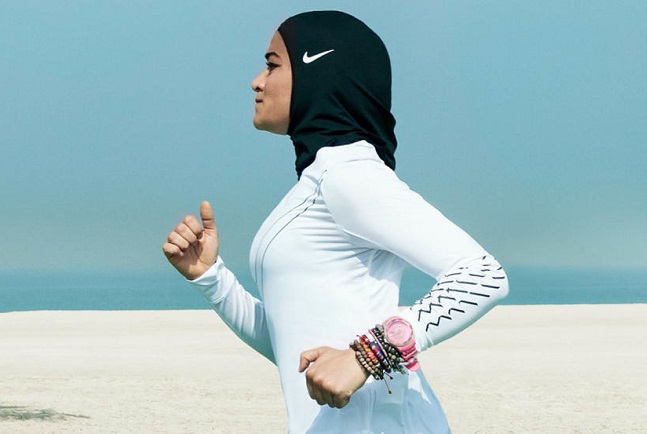Major sportswear manufacturer, Nike, recently revealed an athletic headscarf for Muslim women. The product is termed the “Pro hijab” and is made of lightweight cloth with tiny holes that help the athletes’ skin breathe while keeping the skin covered. In producing such a product, Nike is the first large-scale sportswear company to venture into the Muslim modesty market.
In many ways, Nike’s move is worthy of celebration. In a world increasingly fraught with inter-communal tension and a fear of Muslims, a major brand embracing the hijab as a source of empowerment and paving the way for Muslim women’s integration is laudable. This is especially so when one considers other recent developments in the hijab space, such as the recent ruling by the European Court of Justice that employers can ban staff from wearing visible religious symbols. The ruling arose from two cases involving female Muslim employees fired for wearing headscarves at work, and was decried as a direct attack on Muslim women.
But Nike’s move, while praiseworthy, also raises concerns. Just as Dolce & Gabbana has embraced designer abayas—long, flowing cloaks worn by Muslim women throughout the world, but mostly in Arab states—while leaving young Muslim entrepreneurs in the dust, so, too, is Nike purporting to innovate something that’s already been done. As one commentator wrote on Facebook, “People keep asking me about my reactions to the Nike hijab . . . sorry folks, the capitalist appropriation of a spiritual practice doesn’t impress me. Muslim ladies, please continue to support Muslim owned businesses which [sic] have been making ‘sport hijabs’ for years!”
Just this past June, I featured one such Muslim innovator on my web magazine, altMuslimah.com. Arshiya Kherani of Sukoon Sportswear needed some exposure to help raise funds via Kickstarter, so my staff put her products to the test—and discovered that she had made something that really worked.
For example, Sukoon uses merino wool, not usually considered appropriate for athletic wear, but Kherani’s research revealed otherwise. As our interviewer noted, “The keratin in the wool functions as a second skin and helps regulate body temperature, keeping the skin cool when you sweat, and warm when your body temperature drops. It’s probably one of the best things you can wear.”
Observant Muslim women face unique challenges because of their desire to adhere to the religious virtue of modesty. But time and again, they have come up with unique solutions that help them overcome these challenges without compromising their religious mores. Sukoon Sportswear is a perfect example of a Muslim woman devising a smart, creative solution and, in doing so, catering to a market that many companies did not even realize existed.
Now that these young women have revealed the market to them, major brands are choosing to appropriate the space instead of uplifting the women who were there first. Yes, it’s a natural move from the perspective of capitalism, but if these companies want to do something truly laudable—something that truly embraces diversity and celebrates innovation—they should create spaces for young innovators who know their customers to better market their products. Partnership, not co-optation, would go a long way toward making companies like Nike actually practice the virtue of inclusion that they so often preach.
Asma Uddin is EIC of altM. This piece was previously published at Acculturated.
















